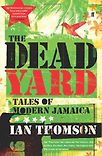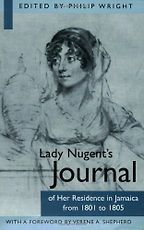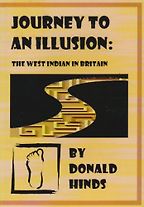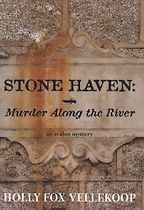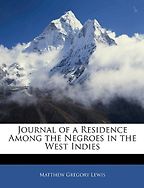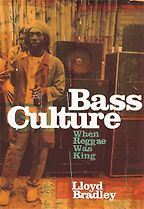Tell us about Lady Nugent’s Journal.
Lady Maria Nugent was the wife of the British governor of Jamaica. During her five-year residence on the island (1801-1805) she kept a diary, which evokes a glittery panorama of sugar impresarios, plantation heiresses and remittance men who would die (or in some cases, were about to die) of drink or yellow fever or a combination of the two.
Lady Nugent was actually American-born – she wasn’t British. In the book she’s a prim and rather proper presence; she describes the Jamaican plantocracy, their vast planter meals and sexual gropings, in tones of fastidious disgust. I think she saw that behind this strenuous excess there was a sort of capitalist system at work. That’s only hinted at, but she does enable you to understand something of the so-called triangle merchants who motivated the slave trade between England, Africa, and Jamaica.
What’s a triangle merchant?
A typical triangle voyage would have carried goods such as gunpowder from England to Africa, and then taken slaves from Africa to the Caribbean, and then finally sugar, coffee, rum, cotton, and some rice on the homestretch to England. It was one of the most nearly perfect commercial systems of modern times, in its loop of supply and demand.
What was her attitude toward slavery?
Interestingly, she refers to slaves as ‘sufferers’. She was not anti-slavery, but she had this sympathy for the ‘sufferer’ – the downtrodden – which I find very curious. There were plenty of books knocking about at the same time that were not like that at all. She was writing what was essentially a pre-abolitionist tract coming from a very Christian outlook. This Christian side of her, that made her so disapproving of the excesses that she saw on the plantations, also roused her sympathy for the ‘sufferers’.
What’s next?
Donald Hinds’s Journey to an Illusion: The West Indian in Britain. It’s one of the great books to have come out of the British-Jamaican experience. Hinds worked on the London buses in the 1950s as a ‘clippie’; his job was to clip tickets. The book is a memoir made up of a series of interviews that he conducted with West Indians in between hours on the buses. He then made of this mesh of interviews something rather special. One thing that makes this book so interesting is the fact that Jamaicans, when Donald Hinds was in London in the 50s, were not numerous. An entire day – an entire week – could go by on a double-decker without him seeing another black face.
So whereas Maria Nugent talks about the impact of colonialism on Jamaica, Hinds gives us the flip-side of that in these interviews with West Indians in London. And what’s his view?
Well, just as Nugent had expressed disgust at the behaviour of British white planters in Jamaica, so Donald Hinds, coming to the so-called ‘mother country’, found himself disillusioned. A recurring theme in the book is Hinds’s discovery that Britain was not only unmindful of the Commonwealth but disinclined to help Jamaicans. Italians in Britain after the war, selling ice cream and confectionery, were made to feel more welcome, despite having fought on Hitler’s side in the conflict. And here he was a British subject and yet was not treated as such.
Before he came to London, Hinds had been a teacher in Jamaica and had read Dickens and Wordsworth, and watched endless genteel films – ‘tea party movies’ from Gainsborough Studios and the like. The racial antipathy he found in England was especially galling for him on that account. I think what happened with Hinds was that he was favourably disposed toward the British public and the idea, even, of Empire, until the race disturbances happened in 1958, which dramatically altered the way he looked at Britain.
It must be painful to buy into the aesthetic of the class system and discover, when you arrive, that you’re at the bottom of it.
Yes. But I think it’s interesting to see the way the Jamaicanisation of London that Hinds foresees in this book quickened after independence in 1962, when more Jamaicans came to Britain. London was then poised to become the most Jamaican city in Europe. The dynamics that Hinds witnessed in the 50s – all that has changed now. Britain’s indigenous culture is now so influenced by Jamaica that a Jamaican inflection is hip among white British teenagers. Black Jamaican culture is youth culture in London; Hinds to a certain extent had foreseen this.
Your third book is Evan Jones’s Stone Haven.
This brief novel is key, I think, to understanding the life and politics of Jamaica today. The novel filters five decades of island history through the life of a single Jamaican family in Portland parish. Grace, a Quaker missionary from America’s Midwest, has defied her family by marrying a ‘coloured’ Portland planter, Stanley Newton. Stone Haven is the name of the house that Stanley builds for Grace on their marriage in 1920, and which becomes the focus of the Newton dynasty’s increasingly clamorous sexual and political improprieties.
‘Clamorous sexual improprieties’ – that’s a great phrase. It does make me think that one of the reasons Jamaican culture is so popular in Britain now is that British culture, historically, is quite repressed.
I think we have a view of Jamaica as being a rather laid-back place where there are no problems – although, in my experience, in Jamaica when they say ‘no problem’ there is one. The other side of all of this is that it is quite an uptight culture in many ways, and there’s a lot of Victorian morality, particularly with the churchgoing population, which is massive in Jamaica. There is a lot of what they call a ‘fenky-fenky’ attitude towards sex, which is actually quite prudish. All of this collision of different views about sex comes probably from slavery where the plantocrats tended to be very abusive of their charges. I think today there remains the sense that it’s a fatherless society, where the father is going to be absent, and he’s busy procreating with other women, to put it very crudely.
Evan Jones himself was a typical product of this mish-mash of different cultures and peoples that you find in Jamaica. In America, pre-Civil Rights, Evan Jones would have been described as ‘yellow’ and in Jamaica as ‘red’ and in England as ‘half-caste’, to use that horrible expression. When Jones first went to America, he found himself in a railway station with signs for separate compartments for ‘whites’ and ‘coloureds’. Because he was a mixed-race Jamaican, he didn’t know which compartment to go into, so he just stood on the platform. I think the colour bar in the United States shocked Jamaicans who settled there, especially during the war. But they began to see it as preferable in some ways to the subterranean racism in 1930s Britain. At least in America it was very clear-cut. It’s more complicated in Britain.
Let’s talk about Matthew Lewis’s Journal of a Residence Among the Negroes of the West Indies.
Yes, well, this is a tremendous book. He was someone a little bit like Lady Nugent, although he’s more fiercely anti-slavery than she is. What I love about Matthew Lewis is that you see in his journal entries this incredible strain of British Gothic running through. Perhaps one should call it Jamaican Gothic because a lot of British accounts of the island are inflected with these gothic conventions. And Lewis is very much saturated in all that. So, from a literary point of view it’s fascinating. But from a political point of view it’s even more interesting.
Lewis’s father owned an estate to the east of the island, and in his first visit to Jamaica in 1818 Lewis expected it to be this perfect paradise. Instead he found it a perfect hell. He found that the overseer had created his own private kingdom, like a Kurtz figure out of Heart of Darkness, subjecting his slaves to this appalling white man’s violence. Lewis made, I think, two more trips to Jamaica during the last three years of his life, and this journal was published 16 years after his death. I’ve read his gothic novels (The Monk is the most famous), and I don’t think anything else he wrote is half as good as the Jamaican journal he kept between 1815 and 1818.
Finally, Bass Culture by Lloyd Bradley.
Bradley covers the development of popular Jamaican music from ska (a speedy, jazz-tinged shuffle beat) to its languid offshoot of rocksteady (a rhythm said to have been adapted from waves hitting the sides of a slave ship), and finally into reggae, which, with its slowed-down, marijuana-heavy beat, would absorb happily into middle-class hippie culture. What I particularly like about this book is that it concentrates on ska music, which was an authentically commonwealth music, in that it took hold in the British cities where there was a concentration of West Indians in the 50s. This music, this ska, was absolutely electric, and it brought a taste of a Trenchtown, a sort of Kingston swagger, to Britain. Singers like Derek Morgan and Desmond Dekker – these are far greater exponents of Jamaican music than Bob Marley. Bradley in this book says precisely that: that Marley, to a lot of middle-class white people, is reggae – and it isn’t at all. It’s the kind of airbrushed version of reggae, with rock music overlaid. Not the same at all.
If you look back over the history that you’ve covered with us today, where would you say we are in the present moment?
Well, from the musical point of view, we’re in the pits. This digital, computer-generated, dance-floor ragga stuff borrows a lot from American rap and hip hop. Not that all of that is awful, not at all, but it’s rather sad the direction that that music has taken. I think that music has lost its moral compass. None of that morality from the classic period of reggae is there at all. And I think you could say it reflects where Jamaica is today; it’s a country that’s absolutely ridden with crime, and it’s a sad story.
Because the British sucked it dry and left it to rot?
Well, there’s a sense in which Britain has abandoned this country, and I think a lot of Jamaicans do feel that. I think that most Jamaicans look to America now, and no longer to Britain. Something’s been lost there, for sure. And something gained, as well – because this old imperial view had to change.
May 2, 2010. Updated: April 23, 2023
Five Books aims to keep its book recommendations and interviews up to date. If you are the interviewee and would like to update your choice of books (or even just what you say about them) please email us at [email protected]
Five Books interviews are expensive to produce. If you've enjoyed this interview, please support us by donating a small amount.

